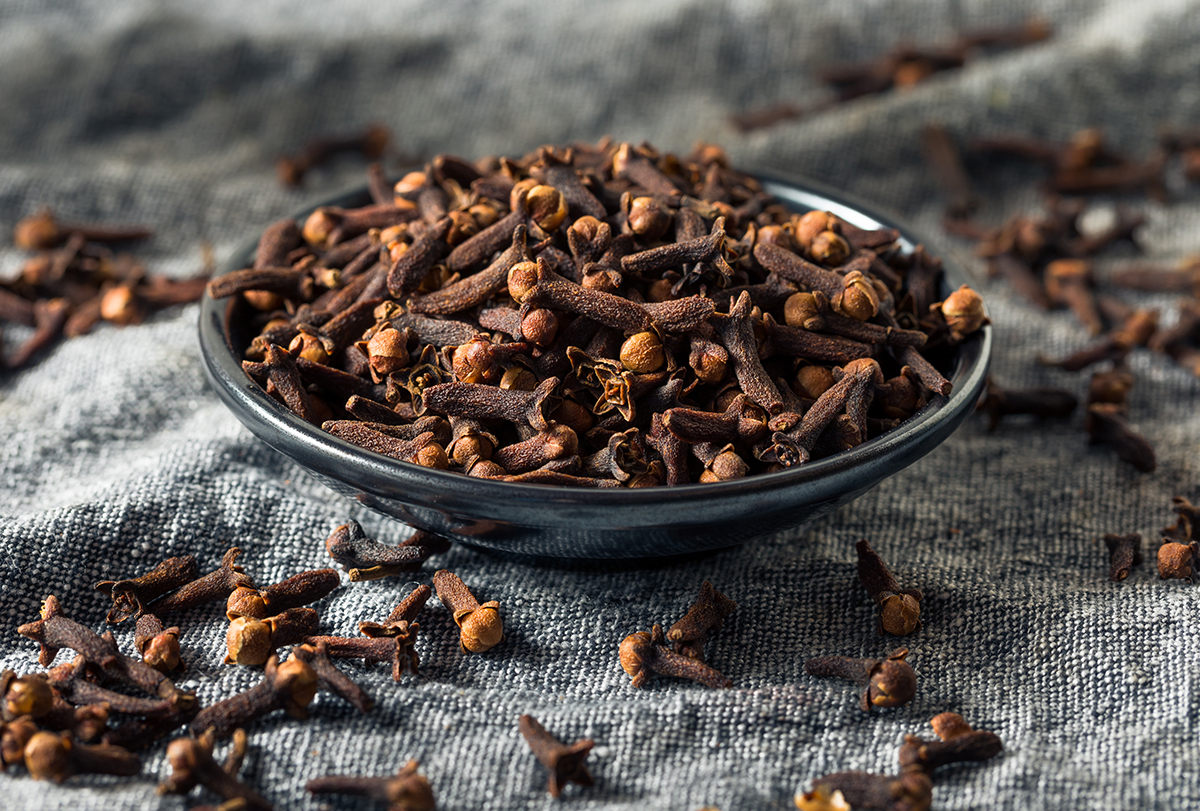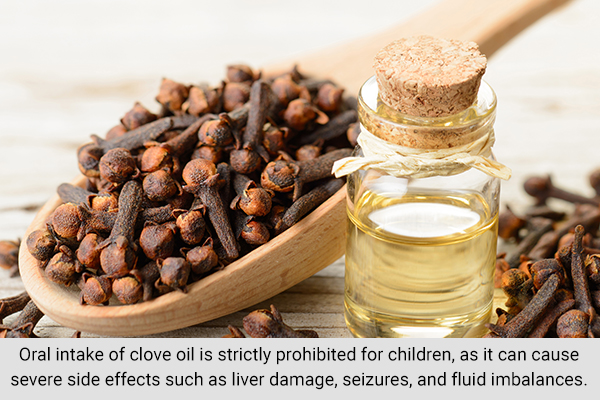In this article:
Cloves are small nail-shaped dried flower buds that come from the evergreen clove tree. They have a sweet, somewhat penetrating flavor and are often used in cooking and baking. But there is more to them than just that.

In Ayurveda and Chinese medicine, the dried flower buds, leaves, and stems, as well as the oil derived from cloves, find much use in a variety of pharmacological applications.
Whole cloves, powdered cloves, and clove oil are readily available in the market the whole year round. These minuscule spices have been historically significant with a great many countries looking to gain a monopoly over clove production and trade.
Benefits of Adding Cloves to Your Diet
Here are 10 ways how cloves can help restore your health.
1. Soothes toothaches

When it comes to toothaches, one effective natural treatment is cloves or clove oil. The anti-inflammatory and analgesic properties of clove have a mitigating effect on the swelling around an infected tooth and the associated pain. (1) Plus, its antiseptic property helps fight and contain the infection.
How to use:
- Simply dab a little clove oil on a cotton ball and rub it on the sore tooth and the surrounding gums. Alternatively, you can grind two cloves, mix in a little olive oil, and apply this mixture on the affected area.
- If you have clove leaves, place one crushed leaf on the pain-ridden tooth and leave it there for a few minutes.
2. Stops bad breath
Being a natural antiseptic, cloves are considered very helpful in getting rid of bad breath and are a common ingredient in toothpaste and mouthwashes. (2) Cloves target the very root of the problem by killing oral bacteria that are often responsible for your bad breath.
Plus, they help cleanse the mouth of such infesting pathogens and the residual matter that tends to accumulate as plaque on the tongue, palate, and upper part of the throat.
Cloves are also characterized by a distinct and strong aroma, which helps freshen up your breath, making it an effective chemical-free alternative to commercial mouthwashes.
How to use:
- Simply chew a few pieces of cloves, and within a few minutes, your foul breath will be gone.
- You can also gargle with cool clove tea two or three times a day.
3. Treats nausea and vomiting

Cloves are also thought to help relieve nausea due to their aromatic and soothing properties. They can even be used to treat pregnancy-related nausea and morning sickness. However, more research is needed to confirm the beneficial effects of cloves in treating these symptoms. (3)
How to use:
- To get relief from nausea, put a few drops of clove oil on a handkerchief and inhale the smell. You can also chew one or two cloves.
- To stop vomiting, mix the powder of cloves with honey and swallow it. You can also mix a few drops of clove oil in a glass of warm water and drink it slowly.
4. Improves digestion
Due to their carminative properties (prevent gas formation and relieve flatulence), cloves play a key role in preserving gastrointestinal health. They help boost digestion by promoting the production of digestive enzymes and gastric acids within the digestive tract, allowing the food to be processed easily and fast.
Cloves help relax the lining of the gastrointestinal tract, in turn alleviating vomiting, diarrhea, intestinal gas, gastric irritability, and stomach aches. Besides, cloves are also thought to be effective in the treatment of peptic ulcers as they promote the secretion of gastric mucus that forms the protective lining of the stomach.
In addition, the essential oils in cloves are highly effective in reducing inflammation and killing bacteria in the stomach to help keep stomach infections at bay. (4)
How to use:
- Simply add a little of this herb to your food to improve digestion.
- Also, you can eat clove after a meal as a mouth freshener.
5. Relieves joint pain

Due to its anti-inflammatory and analgesic properties, clove oil can reduce inflammation and alleviate joint pain, muscle aches, and arthritis pain. (5) Being rich in calcium, manganese, omega-3 fatty acids, and iron, clove oil helps preserve bone density and adds to its tensile strength.
Thus, by preventing bone decay which is the main cause of osteoporosis, cloves can go a long way in curbing joint pain and bone fractures.
How to use:
- Use a little clove oil mixed with a carrier oil like olive oil to massage painful joints, sore muscles, and parts of the body affected by arthritis and rheumatism. Do this several times a day.
- Another option is to roast a few cloves, wrap them in a soft cloth, and place the pouch on the affected body part while it is still warm until your pain subsides.
6. Improves respiratory conditions
Both cloves and clove oil have been found to be very effective for the respiratory system due to their expectorant, antibacterial, and anti-inflammatory properties.
They can be used to treat the common cold, stuffy nose, sore throat, viral infections, asthma, tuberculosis, bronchitis, and various sinus conditions. Plus, this spice may also act as a potential chemoprotective agent for lung cancer. (6)
How to use:
- Simply drink 2 to 3 cups of clove tea daily when you are suffering from a respiratory condition.
- You can also add clove oil to hot water and inhale the aromatic steam.
- To prevent respiratory discomfort, chew one or two cloves on a regular basis.
7. Treats headaches

Whether you have a headache due to tension, a migraine, or cold, clove oil can help get rid of it quickly. Clove oil has pain-relieving and anti-inflammatory properties. (7) Plus, the cooling and soothing effects of the oil help mitigate the pain to a great extent.
How to use:
- Simply put a few drops of clove oil on a piece of cloth or tissue and place it on your forehead and leave it on for about 15 minutes. This will help your blood vessels relax, thereby alleviating the headache.
- Another option is to mix one teaspoon of sea salt and 2 or 3 drops of clove oil in two teaspoons of almond oil, coconut oil, or any other carrier oil and massage it on your forehead.
8. Eases earaches
The mild anesthetic and antibacterial properties present in cloves may help relieve earaches and treat ear infections. (8)(9)
How to use:
- Combine equal amounts of clove oil and sesame oil and slightly warm the mixture. Soak a cotton ball in the mixture and place it just inside the ear canal. The pain will quickly subside and it will help eradicate any infection that may be present.
- Another option is to mix one tablespoon of crushed cloves in ¼ cup of hot olive oil. Let it sit for 30 minutes and then strain. Put a few drops of this oil in the affected ear, leave it in the ear for at least 10 minutes, and then drain it out.
9. Cures acne

Cloves are also considered effective for the treatment of acne and other related skin problems like blackheads, whiteheads, pimples, scarring, and scaly skin. They may also be effective in preventing blemishes or marks that usually appear after acne has subsided. (10)
The antimicrobial properties in cloves help kill the acne-causing bacteria and prevent the problem from spreading to the unaffected areas of the face.
Meanwhile, the anti-inflammatory properties of clove come in handy in reducing the swelling and redness associated with such skin conditions.
How to use:
To treat acne, mix clove oil with jojoba or coconut oil in a ratio of 1:10 and apply it on the affected area using a cotton swab twice daily until you get the desired result.
10. Fights stress
Due to its strong yet soothing aroma, cloves can help you relax and reduce stress. Stress often causes the body’s muscles to become tense. Eugenol, a component present in cloves, is a well-known muscle relaxant and helps counteract the adverse effects of undue stress and anxiety. (11)
How to use:
- Add a few drops of clove oil to your bath water for a relaxing soak. It will soothe your nerves, allowing you to let go of any stress from the body.
- Drinking a cup of clove tea can also work as an effective stress buster.
Nutritional Content of Cloves
Cloves have at least 36 different components, the most important being an essential oil called eugenol.
Plus, cloves are rich in potassium, sodium, phosphorus, iron, manganese, dietary fiber, iodine, vitamins K and C, omega-3 fatty acids, calcium, and magnesium. (12)
Nutritional value of cloves per 100 grams:
- Water – 9.87 g
- Energy – 274 kcal
- Protein – 5.97 g
- Total lipid – 13.00 g
- Carbohydrate – 65.53 g
- Fiber – 33.9 g
- Sugars – 2.38 g
- Calcium, Ca – 632 mg
- Iron, Fe – 11.83 mg
- Magnesium, Mg – 259 mg
- Phosphorus, P – 104 mg
- Potassium, K – 1020 mg
- Sodium, Na – 277 mg
- Zinc, Zn – 2.32 mg
- Vitamin C – 0.2 mg
- Thiamin – 0.158 mg
- Riboflavin – 0.220 mg
- Niacin – 1.560 mg
- Vitamin B6 – 0.391 mg
- Folate, DFE – 25 mcg
- Vitamin A – 160 IU
- Vitamin E – 8.82 mg
- Vitamin K – 141.8 mcg
Precautions With Cloves

- You are strictly advised against inhaling smoke from clove cigarettes or injecting clove oil into the veins as it can trigger harmful side effects such as breathing problems and lung disease.
- Given the vulnerable state that pregnant and breastfeeding women are in, its best to limit the clove intake to food amounts. Since not enough is known to attest to the safety of taking clove in medicinal doses during pregnancy or the nursing phase, stay on the safe side and avoid use.
- Dried clove is particularly robust which can damage dental tissues and lead to mouth sensitivity and irritation.
- Oral intake of clove oil is strictly prohibited for children, as it can cause severe side effects such as liver damage, seizures, and fluid imbalances.
- Evidence suggests that the chemical eugenol found in clove oil might delay the blood clotting process, and thereby increase the risk of bleeding in people with bleeding disorders. This is also an imminent concern when you are scheduled for surgery in the near future. It is therefore recommended to stop using clove at least 2 weeks before the procedure to reduce your risk of bleeding during or after surgery.
- Clove oil, in particular, must be handled with utmost care as it is flammable. Excessive use can irritate your skin, eyes, and respiratory functioning and can cause seizures. Furthermore, it is hazardous to your health and even fatal if swallowed or ingested into the airway.
- Always use clove oil in diluted form by mixing it with a carrier oil or distilled water. Clove remedies are particularly ill-advised for infants, pregnant women, and breastfeeding mothers. Given its strong composition, it’s best to seek your doctor’s consultation before using clove remedies or supplements.
Final Word
Over the years, a growing body of scientific research has unveiled myriad natural health benefits packed in a tiny clove, adding to its appeal. No wonder then that it continues to be one of the most sought-after ingredients the world over, both for its flavor as well as its medicinal value.
- Was this article helpful?
- YES, THANKS!NOT REALLY


